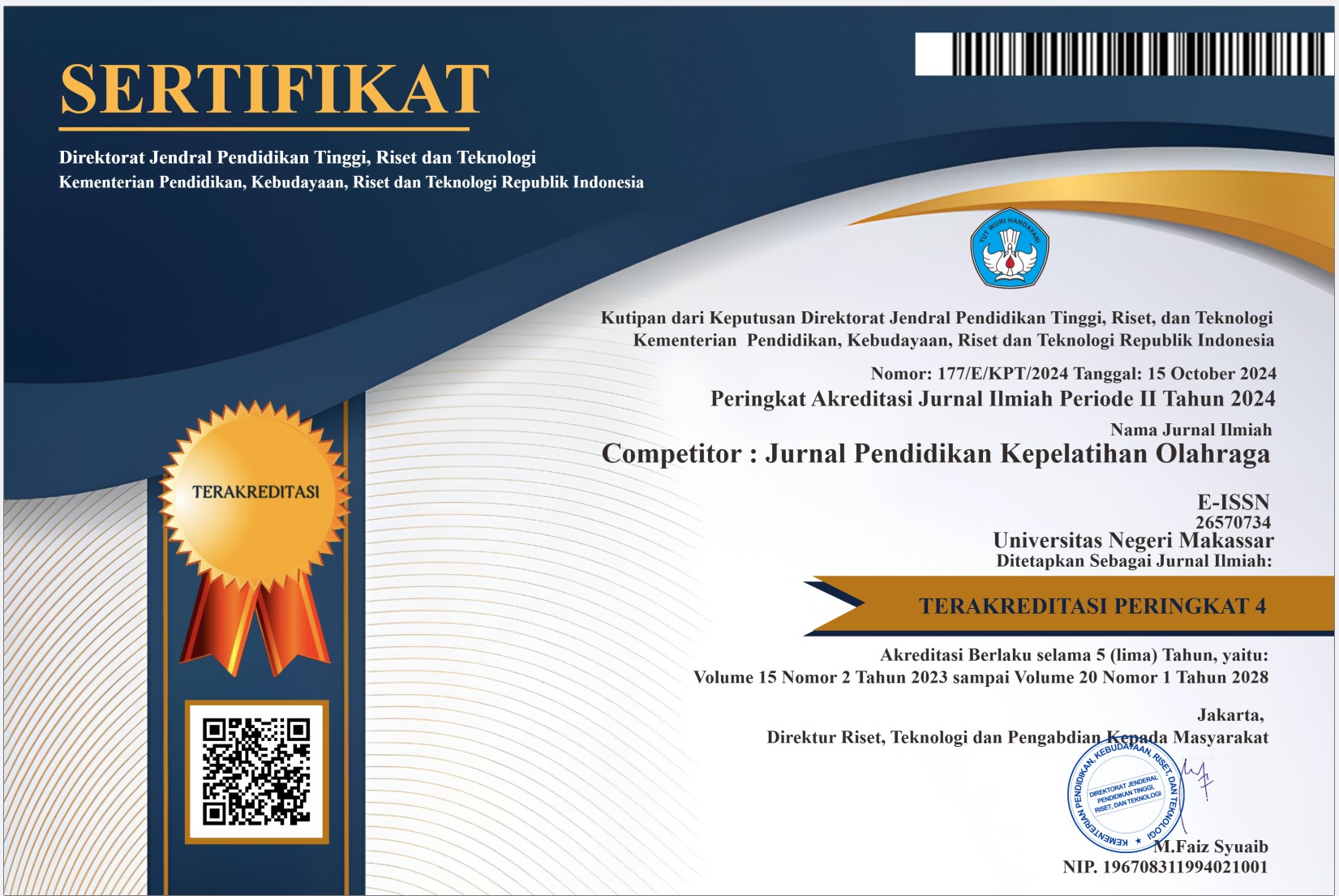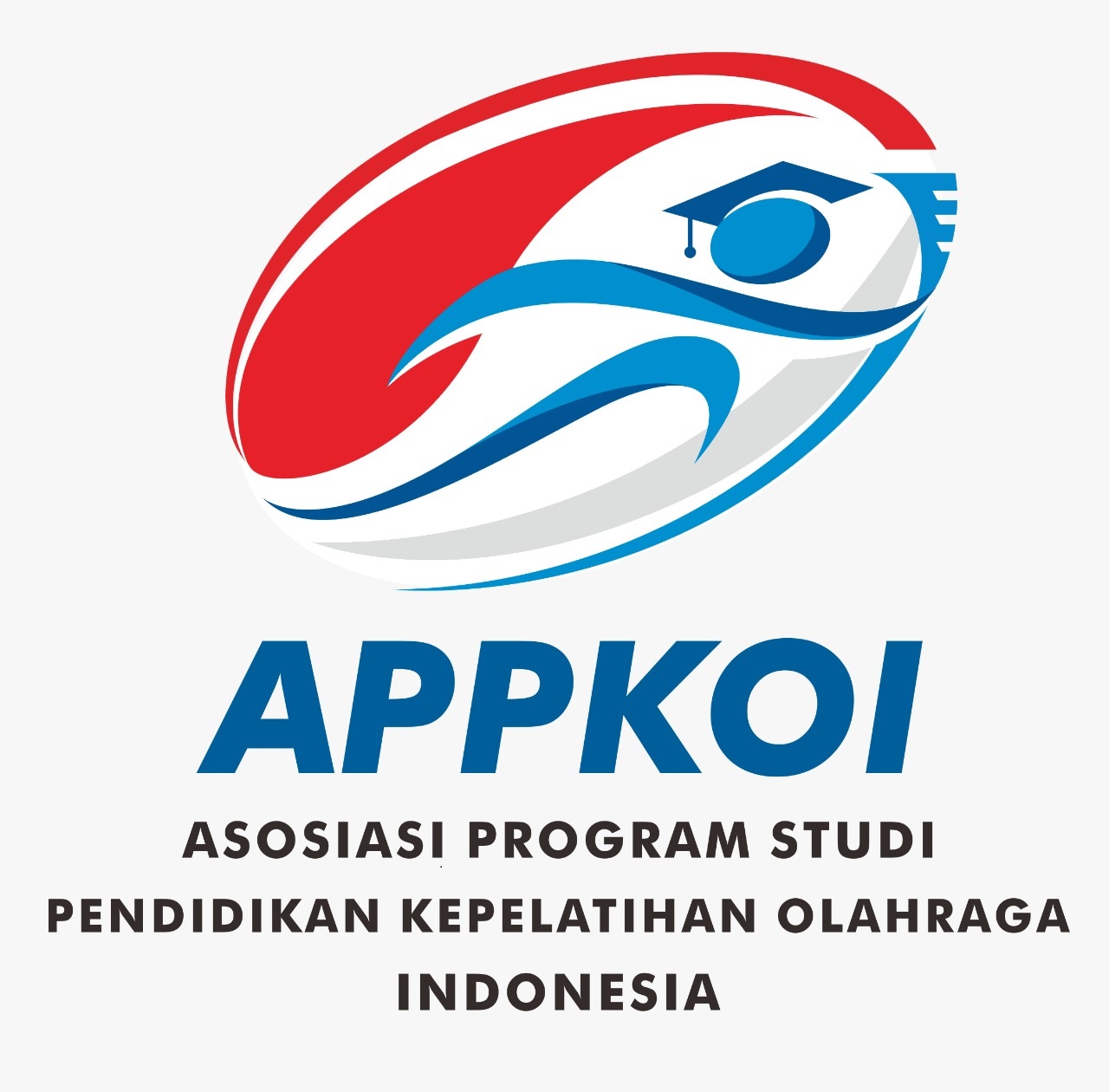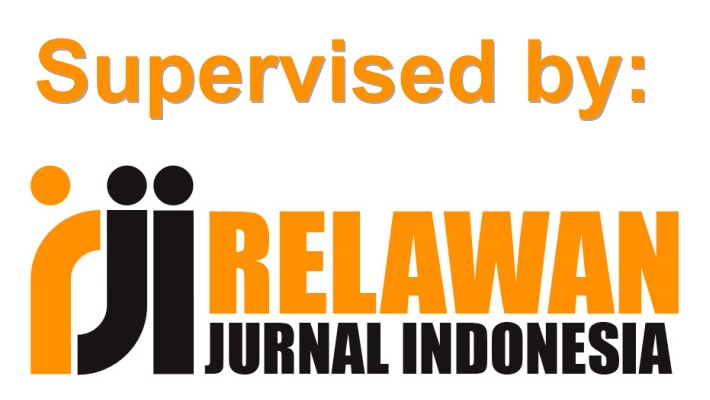Analysis of Confidence, Emotional Regulation, and Discipline Levels Among Elite Karate and Sepaktakraw Athletes of South Sulawesi
DOI:
https://doi.org/10.26858/cjpko.v17i1.71013Keywords:
Confidence, Emotional Regulation, Discipline, Karate, Sepak Takraw.Abstract
This research explores the levels of self-confidence, emotional regulation, and discipline in achieving goals among Karate and Sepaktakraw athletes in South Sulawesi. Using a mixed-method approach that combines surveys and structured observations, the study examines psychological characteristics and their impact on athletic performance. Data were collected from selected athletes through questionnaires and direct observations conducted during training sessions and competitions. The results indicate that self-confidence, emotional control, and goal commitment are key contributors to performance outcomes. However, despite the majority of athletes demonstrating high levels in these variables, notable variations were found, particularly among Karate athletes. Some exhibited moderate levels of emotional regulation and discipline, suggesting that individual differences may influence these traits. Such findings underline the importance of tailored psychological interventions that cater to the unique needs of athletes in different sports disciplines. This study emphasizes the necessity of integrating psychological training into coaching programs to enhance mental resilience, focus, and consistency in performance. By adopting a holistic coaching approach that addresses both physical and psychological dimensions, coaches can better support athletes in achieving peak performance at national and international levels. The insights from this research provide valuable guidance for sports practitioners, enabling the development of evidence-based strategies to optimize athletic potential through a deeper understanding of psychological factors.References
Bartulovic, D., Young, B. W., & Baker, J. (2017). Self-regulated learning predicts skill group differences in developing athletes. Psychology of Sport and Exercise, 31, 61–69. https://doi.org/10.1016/j.psychsport.2017.04.006
Deci, E. L., & Ryan, R. M. (1985). Intrinsic Motivation and Self-Determination in Human Behavior. Springer US. https://doi.org/10.1007/978-1-4899-2271-7
Durand-Bush, N., & Salmela, J. (2001). The development of talent in sport (pp. 269–289).
Goleman, D. (2004). Emotional Intelligence Kecerdasan Emosional Mengapa EQ Lebih Penting daripada IQ. PT. Gramedia Pustaka Utama.
Hamid, M. W., Nawir, N., Rhesa, M., & Sutriawan, A. (2023). Hubungan antara Self-talk dengan Kemampuan Regulasi Emosi pada Mahasiswa-Atlet FIKK UNM. SPORTIVE: Journal of Physical Education, Sport and Recreation, 7(1), 50–59.
Hill, A. P., & Curran, T. (2016). Multidimensional Perfectionism and Burnout. Personality and Social Psychology Review, 20(3), 269–288. https://doi.org/10.1177/1088868315596286
Knight, C. J., Harwood, C. G., & Gould, D. (2018). Sport psychology for young athletes. . Routledge.
Lange-Smith, S., Cabot, J., Coffee, P., Gunnell, K., & Tod, D. (2024). The efficacy of psychological skills training for enhancing performance in sport: a review of reviews. International Journal of Sport and Exercise Psychology, 22(4), 1012–1029. https://doi.org/10.1080/1612197X.2023.2168725
MacNamara, Á., & Collins, D. (2010). The role of psychological characteristics in managing the transition to university. Psychology of Sport and Exercise, 11(5), 353–362. https://doi.org/10.1016/j.psychsport.2010.04.003
McCormick, A., Meijen, C., & Marcora, S. (2015). Psychological Determinants of Whole-Body Endurance Performance. Sports Medicine, 45(7), 997–1015. https://doi.org/10.1007/s40279-015-0319-6
Nicholls, J. G. (1984). Achievement motivation: Conceptions of ability, subjective experience, task choice, and performance. Psychological Review, 91(3), 328–346. https://doi.org/10.1037/0033-295X.91.3.328
Niven, K., Totterdell, P., Stride, C. B., & Holman, D. (2011). Emotion Regulation of Others and Self (EROS): The Development and Validation of a New Individual Difference Measure. Current Psychology, 30(1), 53–73. https://doi.org/10.1007/s12144-011-9099-9
Rohendi, A., & Rustiawan, D. H. (2020). KEBUTUHAN SPORT SCIENCE PADA BIDANG OLAHRAGA PRESTASI. Research Physical Education and Sports, 2(1), 32–43.
Sarkar, M., & Fletcher, D. (2014). Psychological resilience in sport performers: a review of stressors and protective factors. Journal of Sports Sciences, 1–16. https://doi.org/10.1080/02640414.2014.901551
Wang, Y., Lei, S.-M., & Fan, J. (2023). Effects of Mindfulness-Based Interventions on Promoting Athletic Performance and Related Factors among Athletes: A Systematic Review and Meta-Analysis of Randomized Controlled Trial. International Journal of Environmental Research and Public Health, 20(3), 2038. https://doi.org/10.3390/ijerph20032038
Weinberg, R. S. (Robert S., & Gould, D. (2019). Foundations of sport and exercise psychology (7th ed.). Human Kinetics.
Downloads
Published
Issue
Section
License
Copyright (c) 2025 Nukhrawi Nawir, Muflih Wahid Hamid (Author)

This work is licensed under a Creative Commons Attribution 4.0 International License.



















